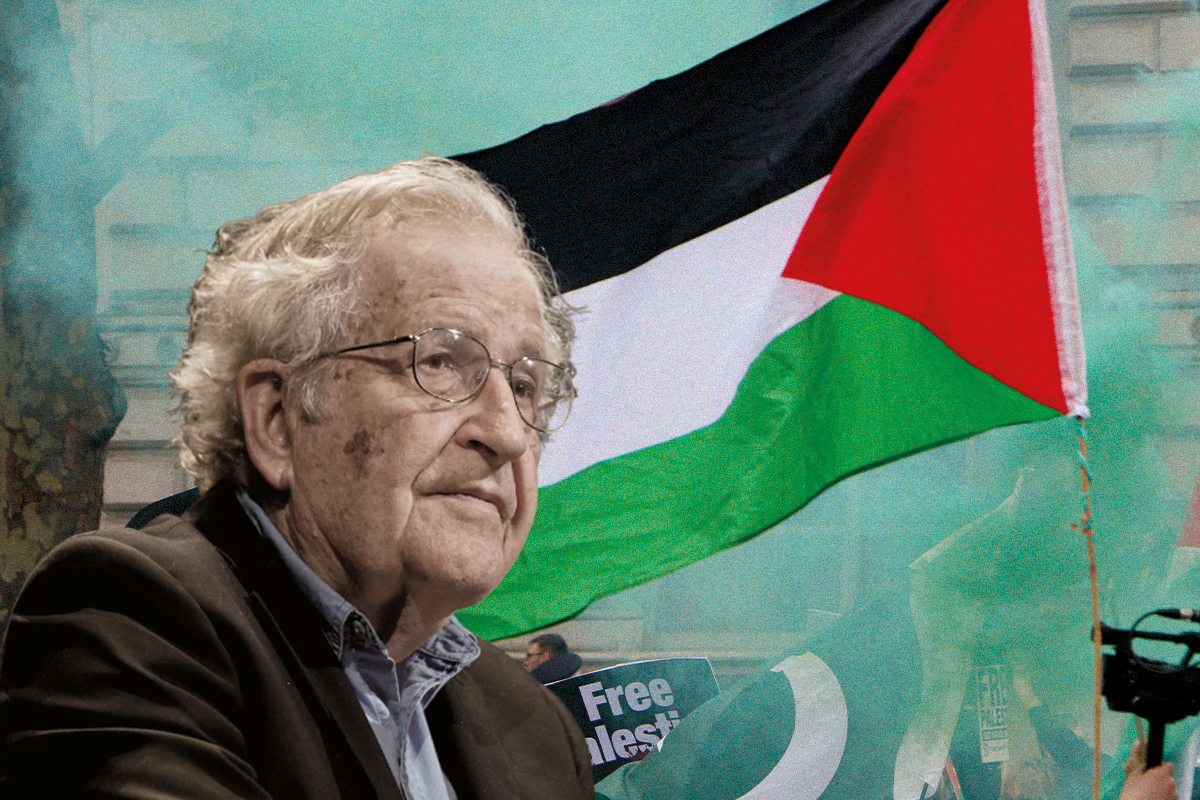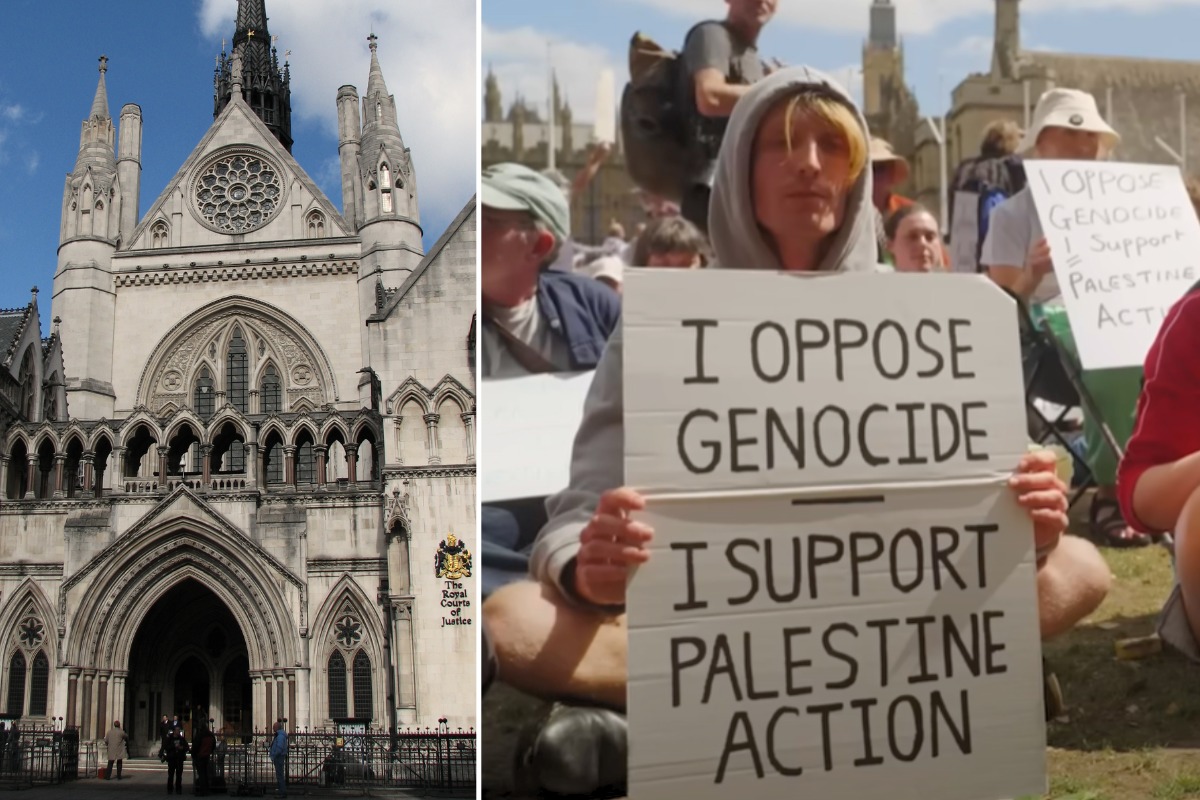When the leaders speak of peace
The common folk know
That war is coming
When the leaders curse war
The mobilisation order is already written out.
– Bertolt Brecht
The struggle by Palestinians to break from their shackles is an inspiration to the workers of the world. Demonstrations in solidarity with Palestinian resistance have swept through the globe: from Lebanon to France; from Britain to Canada. The fight against imperialism has a mass character.
The international outpouring of sympathy following bouts of bloodletting by Israeli imperialism is significant. This expresses an acknowledgement of the cynical and hypocritical role that the ruling class of each country plays in the Israeli-Palestinian conflict.
These ladies and gentlemen will cry crocodile tears when the Israeli Defence Force (IDF) guns down a child throwing sticks and stones. And when a ceasefire is agreed, i.e. a temporary truce favouring Israel, they will wax lyrical about their diplomatic endeavours.
And yet they go rather quiet when it comes to the systematic brutalisation of the Palestinian people.
But most importantly, radical youth and the working class do not believe the problem to be insurmountable. Instead of leaving it for professional politicians to figure out, millions are taking matters into their own hands, and are looking for a way forward.
Order your copy of ‘Israel-Palestine: A Revolutionary Way Forward’ – our new pamphlet from Wellred Books – here.
We are proud to announce a new series of in-depth articles on the topic of Israel-Palestine, putting forward a revolutionary perspective for Palestinian liberation, and lasting peace for the whole region.https://t.co/hQvLm0QjDB
— Socialist Appeal (@socialist_app) April 29, 2023
‘International community’
The growing anti-imperialist sentiment worldwide heralds great opportunities for the left. But we must first cut through the fog of quack-solutions that only add confusion to the matter.
The worst offenders, in this respect, are the celebrities of the international solidarity movement. They hold tight to tried-and-failed reformist formulas, and as a result are frequently prone to despair and pessimism.
One of the clearest examples of this is Professor Noam Chomsky, the renowned critic of US foreign policy. In On Palestine, Chomsky openly advocates for a two-state settlement, arguing that it is the only alternative to a Greater Israel. The latter would see Palestinians purged, either by genocidal means or displacement. The former would begin a rocky process of reconciliation.
As he writes:
“Two states is a rotten solution, but at least it has the merit of having overwhelming international support that has been blocked by the US for the last thirty-five years.”
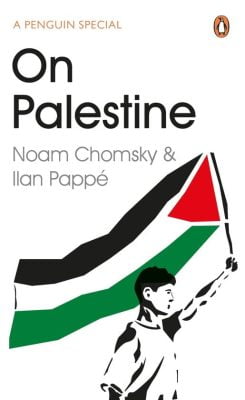
Though admittedly ‘rotten’, he suggests that two internationally recognised states would collapse in on itself, since there is no meaningful way to draw a line in the sand. This would establish the conditions for Israelis and Palestinians to consensus-build in the long term, and usher in – at some undisclosed point in time – a kind of federal society.
What lurks behind this is a belief that if Palestinians were simply recognised as a people vis-à-vis statehood, then the Israeli state would stop encroaching on Palestinians lives and respect their livelihoods.
Why the erosion of internationally recognised borders would be to the benefit of both Israelis and Palestinians is never explained. We would be excused for asking: haven’t we been here before?
The ‘pragmatism’ of Professor Chomsky shined through at his personal address to the United Nations in 2014.
Chomsky pleaded with the UN – a thieves guild for the imperialist powers – to stop the Greater Israel project in its tracks. He pointed to the report submitted to the Security Council in 1976, which called for a two-phase plan for the return of Palestinians to their homes and property, accompanied by ‘temporary peacekeeping forces (!) to facilitate the process’. This, he argued, could be the blueprint for the future.
According to Chomsky, a meaningful solution has apparently been sitting on the table for almost fifty years, just waiting for the right kind of pressure from below and leadership from above to be implemented. This is patently false.
It is precisely such illusions in the ‘international community’ coming to save the day that has led to the present mess. While raising a hue and cry on occasion about the plight of the Palestinians, this so-called ‘community’ – including the hypocritical Arab regimes – have all contributed to the oppression of the Palestinians, and continue to do so to this very day.
Sham statehood
As the saying goes, those that do not learn from history are doomed to repeat it. We have been here before with the two-state dreamers. And the Oslo accords should serve as a cautionary tale for those that think a settlement could ever be brokered at the top to bring about lasting peace.
In 1993, at long last, agreement appeared to have been reached between the Palestinians and Israelis. Yasser Arafat and Yitzhak Rabbin, hand in hand, spoke of the first steps towards Palestinian statehood. The ‘international community’ praised themselves to the heavens, proclaiming peace on Earth. Rabin and Arafat were even canonised with a Nobel Peace prize.
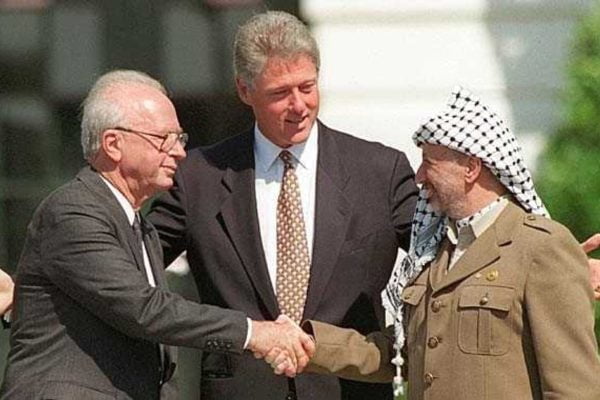
But this optimism soon turned to dust. The setting up of a Palestinian Authority (PA), which was believed by some ‘lefts’ to be a government-in-waiting for a future Palestinian state, marked a humiliating betrayal of the Palestinian cause.
The accords in fact legitimised the main thrust of Zionist expansion since 1948 – abandoning hope of overturning the national dispossession and, in turn, solving the refugee crisis that has spilled into the region.
Rather than providing the basis for a viable Palestinian state, the agreements handed over the poisoned chalice to the PA of policing the ghettoised cities in the West Bank and the refugee camps in the open-air prison that is the Gaza Strip.
The Israeli ruling class could not and cannot tolerate the creation of an economically-viable independent Palestinian state – and that remains the case to this day.
Arafat became Israel’s chief security operator, leading to the erosion of support for the PA and its reduction to a mere agent of Israeli imperialism under Abbas. Arresting, surveilling, and even executing their own people proved a price worth paying for their comfortable petit-bourgeois lifestyles, and the status of being the officially recognised leadership of the people of Palestine.
Israel, meanwhile, continued to flout all of its commitments to the so-called common path toward prosperity.
These are the bitter fruits of such ‘peace’; the reality that hides behind the verbiage of the two-state solution. Trying to find a reformist solution to the conflict – relying on summits, roadmaps and ‘consensus-building’ – in reality perpetuates a state of no solution.
Zionist project
Israel has enacted a conscious policy of creeping annexation since its very beginning. This has been punctuated, of course, by colossal land grabs under the cover of war. For example, the Golan Heights, stolen from Syria almost sixty years ago, remains part of Israel.
This policy has completely reshaped the landscape. As things stand today, roughly 60% of the West Bank (Area C) alone is under the direct control of Israel. The Israeli state continues to control the matter of life and death for Palestinians: having absolute control over the water supply and basic infrastructure; profiting from the captive market in the Palestinian enclaves; restricting the ability of planning permission, or simply bulldozing buildings to make way for Jewish settlements.
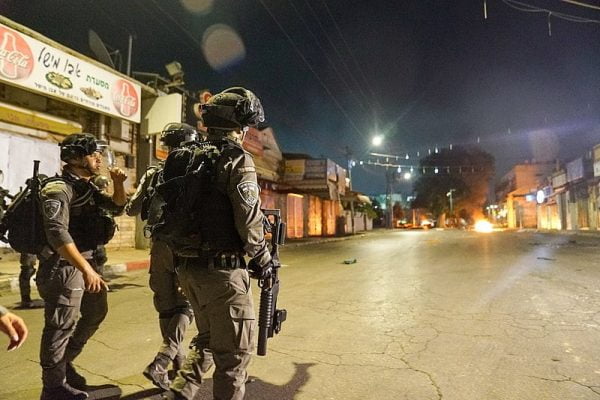
The majority of ‘illegal’ construction work that is carried out – facilitated by the Israeli Land Association (ILA) – is retroactively approved. Alongside this, the Jewish National Fund (a worldwide Zionist organisation) has managed to wrest dunam after dunam from the Palestinians through legalistic smoke and mirrors.
For the success of the Zionist project, the dispossession of the Palestinians has been absolutely necessary: enshrining exclusive ethnic privileges for Jews, and fomenting bitter hatred between the peoples. This has allowed the ruling class to draw behind it the most reactionary elements of Israeli society, and fearmonger to keep the more class conscious in check.
In a word, the Israeli ruling class has never been interested in creating a viable Palestinian state – or peace in the Middle East, for that matter. The various ‘peace processes’ have been a diplomatic facade, allowing the Israeli ruling class to save face. All the while, the ‘international community’ have looked the other way.
Two-states revisited
Nevertheless, Professor Chomsky and others still sow illusions in a two-state solution.
Once we concretise what this would look like, we see what a ridiculous suggestion this remains. For example, sovereign states have a standing army.
Would Israel allow a fledgling Palestinian state to guard its territory, with the strong likelihood that such an army would be funded and trained by hostile neighbouring powers? To ask the question is to answer it.
Would the Israeli ruling class allow an economic competitor on its borders? The transformation of East Jerusalem, once primed as a future capital of a Palestinian state, definitively suggests otherwise.
After decades of land confiscation, accompanied by building settlements in-and-around the Palestinian neighbourhoods, the municipal boundaries of East Jerusalem were increased from 38 square kilometres to 108. Palestinians were refused planning permits, leading to overcrowding, rental prices soaring and an estimated 60,000 leaving for the West Bank.
The Zionist fundamentalist settlers then went on the offensive. They carried out demolition jobs of entire Palestinian districts, focusing on strategic areas in order to seal off the Old City from Palestinian access. This was all aided and abetted by the Israeli Land Authority (ILA).
To this very day, the ILA openly colludes with the settler group Ateret Cohanim, which are trying to wrest control of Sheikh Jarrah from the Palestinian community – an issue that has drawn international attention.
Trump’s ‘deal of the century’ has since provided the rubber stamp of approval to the process that was already underway: Jerusalem being internationally recognised as the capital of Israel. What was once considered a potential economic hub for a Palestinian state, has become a settlers’ dystopia for the Palesinians.
The idea that Israel would have any desire to disentangle itself from the West Bank, or revert back to the 1948 borders, is a complete utopia.
And so any statehood that could be brokered would not be worth the name: it would effectively amount to city-states – disconnected and ghettoised. This would be in the midst of Greater Israel, the dominant power, holding control over whatever is essential (water, energy, food, drugs and medical supplies, etc).
Professor Chomsky’s idea that western leaders would admonish Israel for its aggressive settler-colonial project, and be the initiators of peace and reconciliation, truly beggars belief. Haven’t the last three decades exposed the role of western imperialism’s so-called ‘temporary peacemaking forces’ in the Middle East, as well as their role in the bloody breakup of Yugoslavia?
In a word, the two-state solution is a mirage. Were this dull-witted ‘solution’ to come to pass, it would be nothing less than a repeat prescription for violence and degradation. The best case scenario would be something along the lines of Northern Ireland.
And this example, amongst others, attests to the arrogance and short-sightedness of the imperialists. Rather than ushering in peace, these actions conjured up a Frankenstein’s monster of sectarian violence that the British ruling class has been unable to control, even when it became no longer useful for them. Any attempts to repartition Israel-Palestine would lead down a very similar path.
Do the blood-soaked beginnings of Israel 75 years ago not prove this point a thousand times over? Then again, there are none so blind as those that refuse to see.
A binational state?
Post-Oslo, however, many began to see just how ‘rotten’ the peace process had been. Adapting themselves like chameleons, many left academics warmed to the idea of a binational state: one capitalist state encompassing more or less all of Mandatory Palestine. This is ultimately where Chomsky’s ‘collapsing’ two-state settlement is supposed to lead.
The late US-Palestinian academic Edward Said argued for this option. In his article Truth and Reconciliation, he lambasts the ‘peace process’ which brought no peace:
“It is my view that the peace process has in fact put off the real reconciliation that must occur if the 100 year war between Zionism and the Palestinian people is to end. Oslo set the stage for separation, but real peace can come only with a bi-national Israeli-Palestinian state.”

The influential historian Ilan Pappe is well known for identifying with this idea also. Pappe has argued that the chances for a Palestinian state to survive and even come into a meaningful existence are nil.
Like Said, Pappe acknowledges that the balance of power in the region would result in little hope for Palestinian sovereignty. Thus we must ‘change the narrative’, and direct our energies into fighting for a binational state.
What these intellectuals have done is shift the goalposts to something equally utopian and reactionary. On a capitalist basis, the Israeli ruling class has no interest in opening access to its state to millions of Palestinians. Nor are the Palestinians strong enough militarily to impose this solution.
The ideology of relentless Israeli occupation – Zionism – has evolved historically, and finds many contradictory expressions. But something that underpins it in Israel today is the belief that Eretz Israel is the promised land for the Jews, and Jews alone; a sanctuary that must be kept under lock and key.
Fueling this reactionary and backward viewpoint has been of utmost importance for the Israeli ruling class.
On the one hand, it aims to convince the Israeli working class that they share a common enemy, and that they actively benefit from the expansions and land grabs. On the other, it aims to pacify the Palestinians, and burn into the back of their minds: we are invincible, and resistance efforts will be in vain. It aims to cut across the class questions, keeping both peoples cowed under its iron heel.
The idea that the Israeli ruling class could be convinced to undermine its basis for rule is more appropriate for children’s stories than political perspectives. But if we suspend our faculties of reason for a moment, and hypothesise that the ‘international community’ might force the Zionists’ hand, what would such a state look like?
To be frank, it would result in a form of apartheid. We would see the huge extension of the Jewish Nation State Law, which enshrines the oppression of Palestinians into the law of the land.
We would see no right of return for the 5.9 million officially recognised 1948 Palestinian refugees that have spilled into the region, let alone the hundreds of thousands that joined them after the 1967 war. And therefore, enmity between the peoples would deepen and intensify.
Much more likely than a bi-national state would be the Israeli ruling class brokering agreements with the reactionary Arab regimes to police the Palestinians themselves. There have even been initial discussions around this, with talk of a ‘Hamastan’ (the Gaza Strip) for the Egyptians and ‘Fatahland’ (parts of the West Bank) for the Jordanians. Though no serious steps have been taken in this direction, we should also have no illusions in these reactionary states either.
What is lamentable about the solutions that we are told are ‘realistic’ or ‘practical’ – whether it be the dreams of partition proper, or those that argue for a binational state – is that they fly in the face of reality. They expect imperialism to grow a conscience, realise its wrongdoing, and unilaterally transform itself into a beacon of progress in the Middle East.
Revolutionary potential
In a recent interview with Middle East Monitor, Chomsky stated the following:
“Much of the discussion of this topic seems to me misplaced. It is mostly a debate between two states and one state that eliminates the most important option, the live option, the one that’s being pursued, namely Greater Israel.”
The most important option has indeed been neglected, by Professor Chomsky and co.
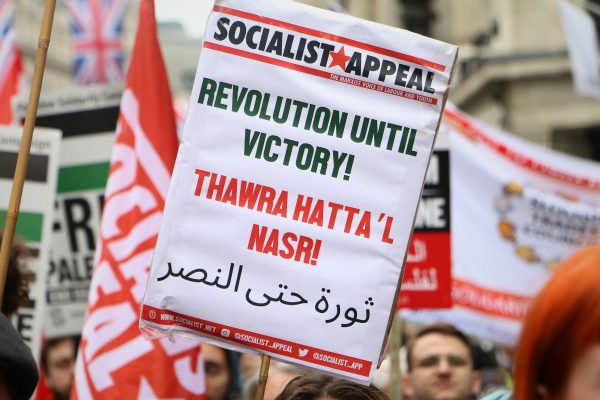
Whilst these academics make addresses at the UN, or apply pressure for their bourgeois to ‘do better’, actual revolutionary developments in the region – ‘the live option’ – pass them by.
Chomsky, Said, and their academic ilk have always ignored the forces capable of changing the situation root-and-branch. Their ‘pragmatism’ amounts to little more than pessimism. Instead, they defer to the very institutions of the so-called international ‘community’ that have blazed a trail of destruction in the region and beyond.
These left intellectuals speak of peace, peace, when there can be no peace on a capitalist basis. One capitalist state or two – drawn up in even the most conceivably generous way to the Palestinians – can solve nothing. As long as Israel remains an aggressive imperialist state, it will continue to negotiate in bad faith, and demand peace on its own terms.
We must be honest. Without a revolutionary strategy that aims to unite all the oppressed people of the region, the horrorshow will continue unabated. Without overthrowing the Israeli state, uprooting the poison of Zionism, as well as toppling the despotic Arab regimes that contribute to the oppression of the Palestinians, there will be no meaningful peace.
On Saturday, activists marched through the streets of London in protest against the continued oppression of the Palestinian people at the hands of the Israeli state. Socialist Appeal comrades joined the demo, calling for a revolutionary way forward.https://t.co/77xU0meI5o pic.twitter.com/KkSRsWBGXS
— Socialist Appeal (@socialist_app) May 15, 2023
The solution does not lie in finding the most fair line in the sand, or devising the most perfect legal institutions to rule over both.
When we look seriously at the problem of national oppression, we will see that, although it has its roots in history, it is made particularly acute by the crisis of capitalism.
The Zionist project relies on pitting workers against one another; convincing Israeli workers that they have more in common with their rulers than they ever could with an ordinary Palestinian.
It is essential for Zionism and the Israeli ruling class that Israeli workers believe they benefit from the oppression of the Arabs – who are dehumanised in the textbooks, and spoken of as their sworn enemies using reactionary religious verbiage.
It is only socialist revolution that will bring down the entire rotten edifice of capitalism in the region.
From Iran to Jordan, Egypt to Lebanon, and amongst Palestinians themselves: the masses have begun to stir. The need for mass struggle to uproot capitalism and imperialism must be the clarion call. Herein lies the key to a peaceful future deserving of the name.

